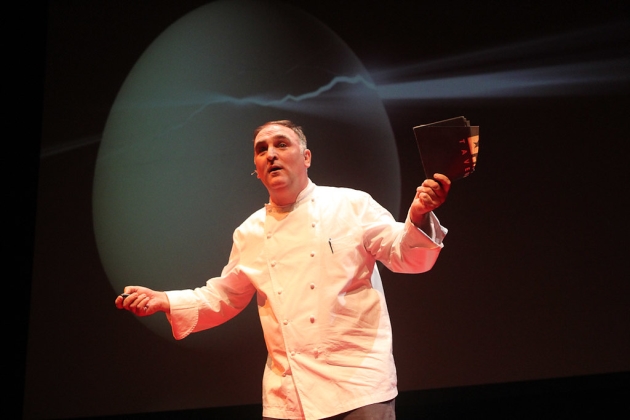Why It Matters

Photo courtesy of TEXxMidAtlantic 2011
If there is such a thing as a “typical” celebrity chef, José Andrés isn’t it. Yes, he’s an internationally recognized culinary pioneer who’s credited with popularizing tapas (Spanish small dishes) in the US. But this is not why Time magazine has twice named Andrés to its list of “100 Most Influential People” or why he will be a keynote speaker at the IHI Forum 2020 (December 6–9, 2020).
What sets Andrés apart from other renowned chefs is the work of World Central Kitchen. The nonprofit he founded in 2010 sets up field kitchens that feed people fresh meals, often within days of an earthquake, hurricane, fire, flood, tornado, or other calamity. Most recently, it’s estimated that World Central Kitchen has fed more than 16 million people around the world since the start of the COVID-19 pandemic, including in 34 states in the US.
Providing much-needed nourishment to people in dire need is certainly laudable, but Andrés goes further. His organization is challenging conventional disaster relief models by not only providing aid, but also employing newly out-of-work restaurant workers to cook the nutritious meals most familiar and appreciated in their own communities. As Washingtonian magazine puts it, the World Central Kitchen’s efforts “[aren’t] just a feel-good achievement but a genuine innovation.”
Always challenging the status quo as both a chef and humanitarian has given Andrés a unique perspective on leadership. His many lessons include the following:
- Lead with empathy. Maybe coming from a family of health care providers (both his parents were nurses) taught Andrés to approach working with people with caring and compassion. “Leadership — 51 percent is empathy,” he has said. “If you don’t show empathy, you cannot be a leader.”
- Embrace continuous improvement. Andrés recognizes the need to keep honing his skills. “I’ve been a cook all my life,” Andrés has said, “but I am still learning to be a good chef. I’m always learning new techniques and improving beyond my own knowledge because there is always something new to learn and new horizons to discover.”
- No leader makes a difference alone. When one of his restaurants earned two Michelin stars, Andrés credited his team for the accolade. Both in his restaurants and his humanitarian efforts, he surrounds himself with talented people. “You’re only as good as the teams you have around you,” he has said.
- Create a culture that empowers others. When World Central Kitchen was first developing, Andrés rejected a conventional organizational chart. “I don’t believe in traditional company structures because the best ideas do not always come from the top,” he has said. He believes a flattened hierarchy encourages engagement and agile problem-solving from his entire team. “We need to be empowering people to be successful,” he has said.
Andrés has, for years, used his public prominence to advocate for policies to address food insecurity, poverty, and immigration reform and to denounce racism. He sees the systemic inequities highlighted by the COVID-19 crisis as further evidence of the need for change. “Humanity, we — unfortunately, we forget quickly, the good and the bad,” he said recently. “What I hope we will not forget is what we learned from the failures in the system. And that will give us the opportunity to fix it.”
Jo Ann Endo, MSW, is IHI’s Senior Managing Editor, Digital Content & Blog.
